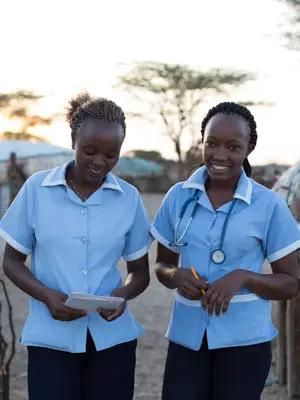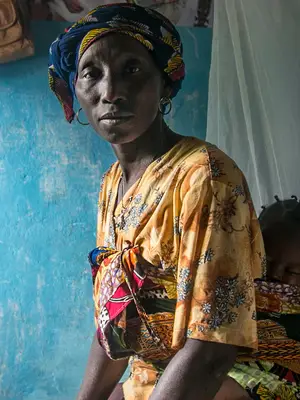
The RTI Global Gender Center is working to eliminate global gender inequalities
Gender inequality remains a global issue, impacting the health, education, economic development, relationships, and political participation of people everywhere. No one should face bias based on their gender, and to combat these disparities, we established the RTI Global Gender Center in 2014.
RTI's Global Reach in Tackling Gender-Related Challenges
RTI is at the forefront of addressing gender-related challenges. We have implemented over 1,000 gender-focused projects across more than 80 countries. Our work spans continents, including North and South America, Africa, Asia, Australia, and Europe. Partnering with government agencies, foundations, and donor organizations, we conduct culturally sensitive and socially relevant research to drive meaningful change. Our center is supported by over 500 dedicated affiliates, along with experts from local and global organizations. This diverse team brings a wealth of skills and knowledge from various fields to advance gender equality.
Collaborating to Address Gender Inequality Across Diverse Populations
We collaborate with a wide range of people and communities globally to address pressing challenges associated with health and wellness, economic empowerment, education, and gender-based violence. Our mission is to address and reduce gender disparities across all these areas, working toward a world where gender equality is a reality for everyone. We have led human-centered projects collaborating and working with:
- Adolescents, children, young adults, men, and women who face barriers in a diversity of communities
- People across the spectrum of sexual orientations and gender identities
- People who engage in sex work
- Individuals and couples who use alcohol and other substances
- Black, Indigenous, and other people of color who frequently face underrepresentation
Through these collaborations, we aim to address disparities, promote equity, and drive meaningful and lasting change.
RTI Global Gender Center Working Groups
The RTI Global Gender Center spans across the institute, with affiliates from every corner of RTI’s practice areas and capabilities. The Center therefore has two smaller working groups developed by affiliates who wanted to take their passions to the next level and advance the impact of addressing gender inequality.
LGBTQIA+ Rising is committed to leading efforts to support the inclusion of LGBTQIA+ populations and promote respect for LGBTQIA+ human rights across various domains. Our working group was created by passionate affiliates with the goal of integrating and advocating for research that is inclusive of diverse sexual orientation, gender identity and expression, and sex characteristics (SOGIESC) experiences This includes, but is not limited to, queer, questioning, transgender, intersex, asexual, pansexual, and non-binary identities. This inclusive approach acknowledges the diversity within the LGBTQIA+ communities and the evolving language around gender and sexuality.
Our work has established RTI as a leader in SOGIESC research. LGBTQIA+ Rising has been instrumental in developing updated guidelines that ensure inclusivity and ethical engagement with LGBTQIA+ people. These guidelines serve as a framework for our research projects and interactions with LGBTQIA+ communities, emphasizing respect and representation.
Recently, we conducted a thorough review of recommendations for engaging LGBTQIA+ communities in research. This review involved synthesizing insights from various academic and community-serving organizations in collaboration with subject matter experts at RTI. The two primary objectives were to advocate for the formal development and implementation of LGBTQIA+-inclusive research practices and to provide researchers with practical tools and guidance to champion inclusivity in their work.
While there is no single approach to LGBTQIA+-inclusive research, our guidelines and the information we provide offer valuable direction. We emphasize the need for ongoing dialogue with project teams, community partners, and other collaborators to develop approaches that yield the most meaningful and impactful research outcomes.
Resources:
- Bringing an equity-centered framework to research: Transforming the researcher, research content, and practice of research
- Equity, Diversity, Inclusion, Belonging: Progress at RTI
- LGBTQIA+ Research
- Rising to the Challenge: Prioritizing LGBTQIA+ Equity in Research
- Operationalizing Equity in Evaluation Work with the Colorado Department of Public Health and Environment
- To who it may affirm: Considerations for advancing LGBTQIA+ equity in research
The International Gender Working Group (IGWG) is dedicated to fostering a collaborative community focused on international development with a gender perspective. IGWG brings together expertise and resources to share ideas, lessons learned, and key successes in order to more creatively and successfully implement gender work across RTI and ultimately grow the gender work we do. IGWG’s mission involves curating and managing essential information about gender-related activities through the RTI Global Gender Center for affiliates. This central hub supports efforts by providing access to valuable insights and best practices, enhancing strategic alignment.
Established by passionate professionals, IGWG integrates gender considerations into international development projects and proposals, aiming to advance gender equality globally. The group drives RTI’s contributions to gender equity in the international development sector and supports learning across projects and geographies. By strengthening the community and refining internal processes, IGWG supports RTI's leadership in gender-focused development. The group strives to embed gender perspectives in all aspects of its work, driving meaningful change and promoting equity worldwide.
RTI Global Gender Center Leadership

Learn More
Read about our worldwide work in economic empowerment, health and wellness, educating girls and women, ending gender violence, and more.




























































































































